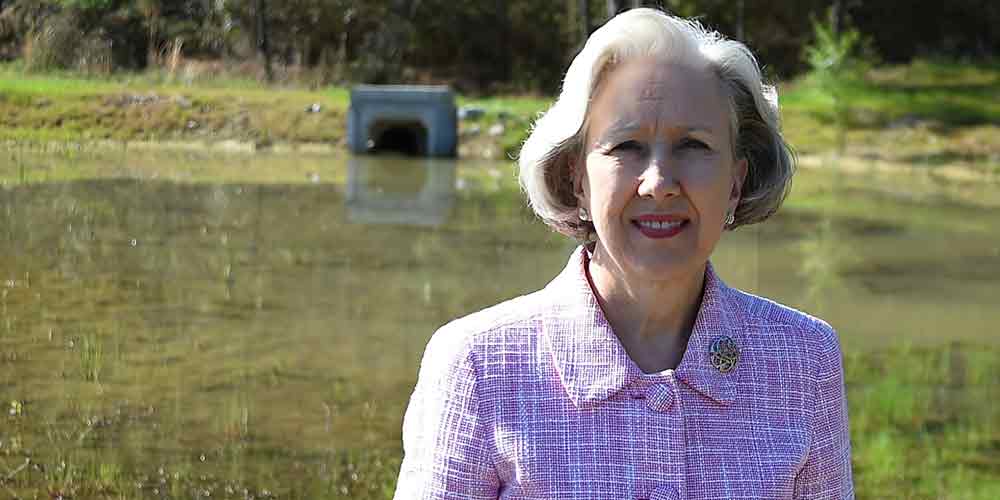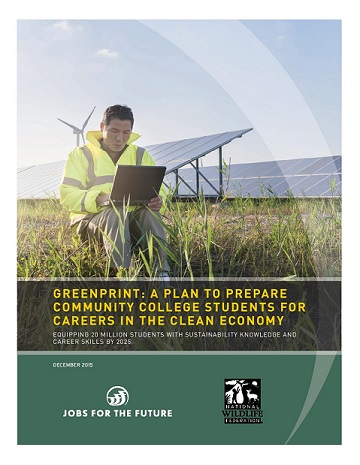ECC President Cited in National Greenprint Report

Dr. Deborah Lamm, president of Edgecombe Community College, was recently referenced in a national report that addresses workforce development for a green economy. Shown behind Dr. Lamm is one of several stormwater wetlands created on the Tarboro campus. The college partnered with Sound Rivers, who secured grants from the Environmental Enhancement Grant program, to construct three stormwater wetlands, a bioretention cell, and a rain garden to clean up stormwater runoff.
Dr. Deborah Lamm, president of Edgecombe Community College, is cited in a national report that focuses on workforce training for a green economy.
 The report – Greenprint: A Plan to Prepare Community College Students for Careers in the Clean Economy – was issued by Jobs for the Future, National Wildlife Federation, Bank of America, and education leaders across North America. The report addresses the challenge of linking workforce development and environmental quality in the U.S. and beyond.
The report – Greenprint: A Plan to Prepare Community College Students for Careers in the Clean Economy – was issued by Jobs for the Future, National Wildlife Federation, Bank of America, and education leaders across North America. The report addresses the challenge of linking workforce development and environmental quality in the U.S. and beyond.
In the report, Dr. Lamm says, “Edgecombe Community College has a responsibility to prepare students with the knowledge and skills needed to reduce environmental impacts and to address critical resource shortages. By including sustainability in a broad spectrum of educational programs, students are enabled to make better decisions regarding fuels, energy efficiency, energy production, food production, water usage, and food choices.”
Maria Flynn, senior vice president of Jobs for the Future, comments in the Greenprint foreword: “Imagine the impact of 20 million American community college graduates equipped with the skills necessary to fulfill well-paying jobs that have the added benefit of cleaning up our environment and strengthening communities. That was the goal of our collaboration – to equip millions of students to compete in the economy and contribute to society, at the same time.”
Green initiatives began at Edgecombe Community College over a decade ago when the college instituted a four-day work week in the summer of 2005 to reduce utilities. Employees work ten-hour days Monday through Thursday, and the college is closed on Fridays. Since this schedule was put in place, the college has saved as much as $23,000 each summer.
In 2012, the college began a project to install energy conservation measures and to reduce energy consumption campus wide through facility improvements to nine buildings on the Tarboro campus and one building on the Rocky Mount campus.
The enhancements included lighting upgrades, new heating, ventilation, and air-conditioning equipment, as well as building automation.
In addition to incorporating sustainability practices as an institution, the college has developed courses and programs in sustainability in both the curriculum and continuing education divisions.
ECC is one of only five community colleges in the nation that offers a program in historic preservation and the only one in North Carolina. “Historic preservation is the ultimate recycling project,” says Dr. Lamm. “The preservation of old structures saves on costs associated with new construction and protects environmental resources.”
The Historic Preservation Technology program emphasizes hands-on skills used in the preservation of historic structures. Degree, diploma, and certificate programs are offered, including a Green Building certificate added in 2015.
The college has developed a number of other programs in an effort to develop green job training and education to support new and existing green economic opportunities, including certificate programs in alternative fuels in Automotive Systems Technology, energy management systems in Manufacturing Technology, green energy systems in Facilities Maintenance, residential weatherization, and building operator.
The Windspire wind turbine is the first at any community college in the state. Installed on the Tarboro campus in 2010, it is used as an educational tool.
The Wetlands Trail is another resource for students at Edgecombe Community College. The wetlands area comprises about 30 acres of the Tarboro campus and is an outdoor living laboratory.
“Community colleges are on the frontlines of sustainability skills education, with nearly 40 percent pioneering educational initiatives that promote sustainability skills,” explains Flynn. “These initiatives contribute to students’ career potential, respond to local employer needs, support the health of the regional environment, and benefit the local economy.”
“When we launched initiatives such as Greenforce in 2010 with Jobs for the Future and Campus Ecology in 1989 with education leaders across hundreds of two- and four-year colleges and universities, we envisioned a whole new generation of graduates, equipped to lead the way for healthy, clean, wildlife-friendly communities,” says Julian Keniry, senior director at the National Wildlife Federation, “and that is now happening thanks to bold innovation and leadership by college and university presidents, faculty, and students.”
